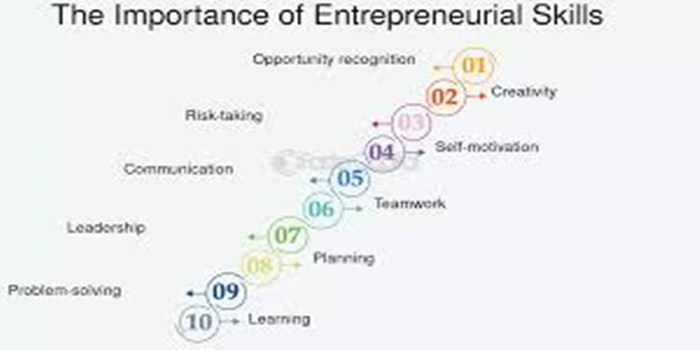In this article, we explained entrepreneurial skills, the examples, how to improve, the features, the importance, furthermore we talked about the most valued skills.
Definition
Entrepreneurial skills involve a wide-ranging of various skill sets like technical skills, leadership and business management skills and creative thinking. Because entrepreneurial skills can be applied to many different job roles and industries, developing your entrepreneurial skills can mean developing several types of skill sets. For instance, to be a successful business owner, you may need to develop your business management skills. To build and maintain successful project teams you might need to improve your leadership and communication skills.
Examples of entrepreneurial skills
Business management skills
Teamwork and leadership skills
Communication and listening
Customer service skills
Financial skills
Analytical and problem-solving skills
Critical thinking skills
Strategic thinking and planning skills
Technical skills
Time management and organizational skills
Branding, marketing and networking skills
How to Improve Entrepreneurial Skills
There can be many different methods that you can use to develop your entrepreneurial skills. You might take a class, attend a seminar or participate in a networking workshop. You might also consider the following steps to help you improve your skill set.
Take a course.
Attend events and workshops.
Seek out experienced mentors.
Build your leadership skills.
Learn how to manage finances.
The Features of Entrepreneurial Skills:
Communication: Entrepreneurs must effectively convey ideas and persuade others to support their ventures.
Leadership: Inspiring and motivating teams is essential for success.
Strategic Vision: Anticipating future trends, identifying opportunities, and setting long-term goals is vital.
Teamwork: Building and collaborating with others to leverage diverse skills is important.
Passion: Enthusiasm and dedication to the business idea are key.
Adaptability: Successfully navigating changing market conditions and challenges is necessary.
Creativity: Developing innovative solutions and approaches is crucial.
Motivation: Maintaining drive and perseverance in the face of obstacles is important.
Product/Service Knowledge: A thorough understanding of the offering is essential.
Negotiation: Effectively communicating and reaching agreements with various stakeholders is important.
Risk-Taking: Being willing to take calculated risks is a hallmark of entrepreneurship.
Decision-Making: Making timely and effective decisions under pressure is crucial.
Time Management: Organizing and prioritizing tasks effectively is essential.
Problem-Solving: Identifying and addressing challenges creatively and strategically is key.
Networking: Building relationships with potential investors, partners, and customers is important.
Financial Literacy: Understanding and managing finances is vital for business sustainability.
Emotional Intelligence: Managing emotions, empathy, and resilience are crucial for navigating stress and challenges.
The Importance of Entrepreneurial Skills:
- Building and Leading a Business:
Leadership:
Entrepreneurs need to guide teams, inspire employees, and motivate them towards achieving goals.
Business Management:
This includes skills like budgeting, financial planning, and managing resources effectively.
Time Management:
Entrepreneurs must prioritize tasks and manage their time efficiently to meet deadlines and stay organized.
Communication:
Effective communication is essential for building relationships, networking, and conveying ideas clearly.
Problem-Solving:
Entrepreneurs encounter challenges, and the ability to analyze problems and find solutions is vital.
- Adapting to Change and Embracing Innovation:
Adaptability:
The business environment is constantly changing, and entrepreneurs need to be able to adapt to new situations and embrace change.
Creativity and Innovation:
Entrepreneurs must be able to come up with new ideas, find creative solutions to problems, and develop innovative products or services.
Growth Mindset:
Entrepreneurs need to view challenges as opportunities for learning and improvement.
Risk-Taking:
Entrepreneurs often need to take calculated risks to pursue new ventures and opportunities.
- Personal and Professional Growth:
Financial Literacy:
Understanding finances and making informed financial decisions is crucial for personal and business success.
Networking:
Building a strong network of contacts can provide support, mentorship, and business opportunities.
Emotional Intelligence:
Entrepreneurs need to manage their emotions, understand others, and remain calm under pressure.
Resilience:
The ability to bounce back from setbacks and persevere through challenges is essential.
Self-Awareness:
Understanding one’s strengths and weaknesses is important for personal and professional development.
Confidence:
Believing in oneself and one’s ideas is crucial for attracting investment and building a successful business.
- Contribution to Society and the Economy:
Innovation:
Entrepreneurship drives innovation and the development of new products and services, which can improve people’s lives and boost the economy.
Job Creation:
Entrepreneurs create jobs and contribute to economic growth by starting and growing businesses.
Community Development:
Entrepreneurs can make a positive impact on their communities by creating businesses that provide goods and services, create jobs, and support local initiatives.
The Most Valued Entrepreneurial Skills:
Resilience and Grit
Why it matters: Entrepreneurs often face failure and rejection. The ability to bounce back and persist is crucial.
Problem-Solving
Why it matters: Entrepreneurship is fundamentally about identifying problems and creating solutions.
Creativity and Innovation
Why it matters: Coming up with new ideas, products, or ways of doing things sets successful entrepreneurs apart.
Leadership
Why it matters: Entrepreneurs must inspire, manage, and lead teams, even in uncertain or challenging environments.
Adaptability and Flexibility
Why it matters: Markets, technologies, and customer preferences change quickly. Entrepreneurs must pivot when necessary.
Strategic Thinking
Why it matters: Building a business requires long-term vision, planning, and the ability to see the big picture.
Financial Literacy
Why it matters: Understanding cash flow, budgeting, and financial forecasting is key to keeping a business afloat.
Sales and Marketing Skills
Why it matters: Whether selling a product, service, or idea, entrepreneurs must know how to reach and convert customers.
Communication Skills
Why it matters: Clear, persuasive communication is essential for pitching investors, managing teams, and attracting customers.
Networking and Relationship Building
Why it matters: Building strong professional networks opens doors to funding, partnerships, and mentorship.
Conclusion
Entrepreneurial skills can encompass a large range of both soft and hard skills. Because of the many business roles entrepreneurs may take on, they may also develop a variety of different skill sets to accommodate the growth of their businesses and brands. Developing the following skill sets can also help you develop your entrepreneurial skills.
READ: The Rise of Entrepreneurial Unemployment

